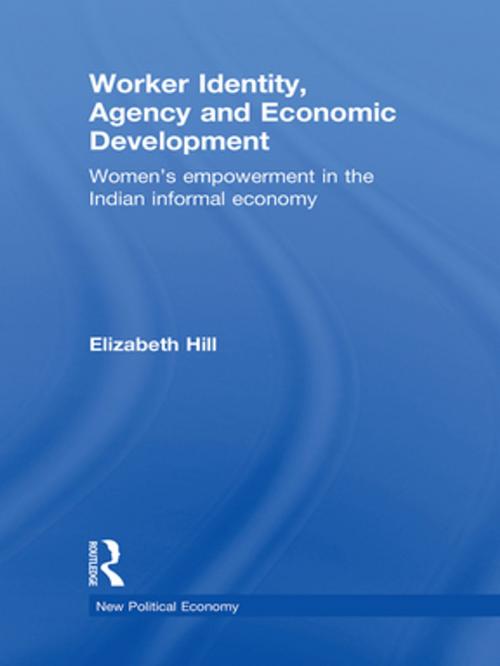Worker Identity, Agency and Economic Development
Women's Empowerment in the Indian Informal Economy
Business & Finance, Economics, Economic Development| Author: | Elizabeth Hill | ISBN: | 9781136954276 |
| Publisher: | Taylor and Francis | Publication: | July 2, 2010 |
| Imprint: | Routledge | Language: | English |
| Author: | Elizabeth Hill |
| ISBN: | 9781136954276 |
| Publisher: | Taylor and Francis |
| Publication: | July 2, 2010 |
| Imprint: | Routledge |
| Language: | English |
More than nine out of every ten working women in India are employed in the informal economy, unprotected by labour laws and excluded from basic forms of social security. They work as daily labourers in the fields, small producers and industrial outworkers in their own homes and as vendors on the streets. These workers typically receive very low wages and experience extreme forms of social, economic and political marginalisation. This book examines what types of interventions can improve the well-being of women working in the Indian informal economy. Using the case study of the Self Employed Women’s Association, Worker Identity, Agency and Economic Development argues that work-life reform for informal women workers has moral and social dimensions, as well as economic.
Drawing on the work of social philosopher Axel Honneth, the book argues that worker agency is critical to the process of work-life reform in the informal economy. Using empirical data collected amongst SEWA members the study shows that there is a positive and developmental relationship between a worker’s identity, or psychological integrity, and her actual capacity to engage in the political economy for constructive change. The study shows that membership based organisations can promote the social foundations of recognition and respect that are critical to identity and agency, as well as provide worker’s with real opportunities to develop alternative non-exploitative economic institutions that deliver improved wages and social security. But in organizing informal workers for collective action the existing distribution of power and wealth, as well as gender privilege are challenged. The result is social conflict and sometimes violence. Conflict of this nature is endemic to the development process, but is often overlooked in development literature and policy design.
The book will be of interest to development scholars and practitioners, as well as those interested in the dynamics of women’s empowerment and socio-economic change for informal economy workers.
More than nine out of every ten working women in India are employed in the informal economy, unprotected by labour laws and excluded from basic forms of social security. They work as daily labourers in the fields, small producers and industrial outworkers in their own homes and as vendors on the streets. These workers typically receive very low wages and experience extreme forms of social, economic and political marginalisation. This book examines what types of interventions can improve the well-being of women working in the Indian informal economy. Using the case study of the Self Employed Women’s Association, Worker Identity, Agency and Economic Development argues that work-life reform for informal women workers has moral and social dimensions, as well as economic.
Drawing on the work of social philosopher Axel Honneth, the book argues that worker agency is critical to the process of work-life reform in the informal economy. Using empirical data collected amongst SEWA members the study shows that there is a positive and developmental relationship between a worker’s identity, or psychological integrity, and her actual capacity to engage in the political economy for constructive change. The study shows that membership based organisations can promote the social foundations of recognition and respect that are critical to identity and agency, as well as provide worker’s with real opportunities to develop alternative non-exploitative economic institutions that deliver improved wages and social security. But in organizing informal workers for collective action the existing distribution of power and wealth, as well as gender privilege are challenged. The result is social conflict and sometimes violence. Conflict of this nature is endemic to the development process, but is often overlooked in development literature and policy design.
The book will be of interest to development scholars and practitioners, as well as those interested in the dynamics of women’s empowerment and socio-economic change for informal economy workers.















